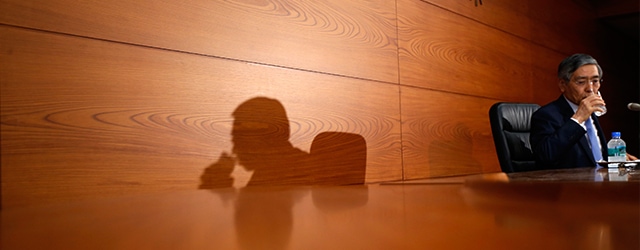Japan | Newsmakers

Just weeks after Haruhiko Kuroda, governor of the Bank of Japan, surprised the world with a bold plan to inflate Japanese assets and weaken the Japanese yen by buying 80 trillion yen ($680 billion) in Japanese bonds, exchange-traded funds and real estate investment trusts, prime minister Shinz Abe upstaged him by calling a snap election for mid-December, two years ahead of schedule.
Now the continuation of Kuroda’s October 31 quantitative easing initiative—which came before a revelation in late November that Japan’s economy was officially in recession again—is being called into question. James Swanson, chief investment strategist at MFS Investment Management in Boston, suggested that Kuroda’s fate was tied to that of Abe’s, who he says called an early election as a “reaffirmation” of his economic growth platform.
But John Vail, chief global strategist at Nikko Asset Management in New York, and Robert Feldman, managing director, chief economist and head of fixed-income research at Morgan Stanley MUFG Securities in Tokyo, insist the election results will have no impact on the Bank of Japan’s monetary policy. Kuroda is in the second year of a five-year term. Every BoJ governor before him has completed his term despite 12 prime ministers being shuffled through the Diet (Japanese parliament) in the past 20 years.
Kuroda’s latest round of quantitative easing was announced the same day that Japan’s $1.2 trillion Government Pension Investment Fund announced it would double its investment in Japanese and foreign equities.
If his efforts keep the yen weak, he could take the edge off Japan’s bitter territorial disputes with China, Korea and Russia. “To the extent that Japan devalues, the nature of its trade with its neighbors is one in which Japan is selling lots of capital equipment that they need, and capital equipment becomes that much cheaper, that would be a gift to its trading partners,” says Richard Samuels, Ford International professor of political science and director of the Center for International Studies at the Massachusetts Institute of Technology.



